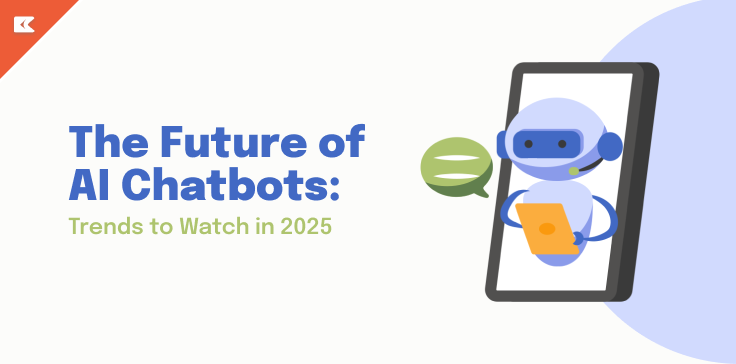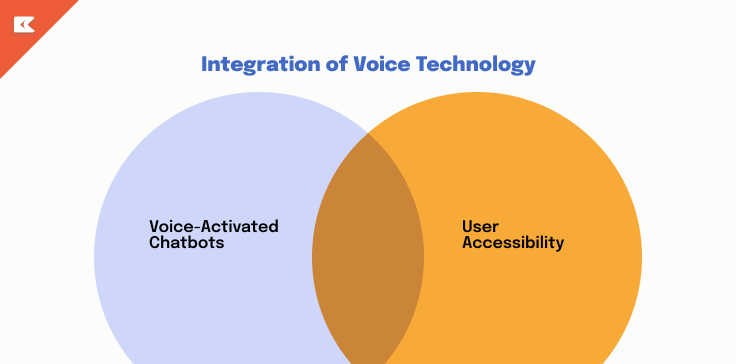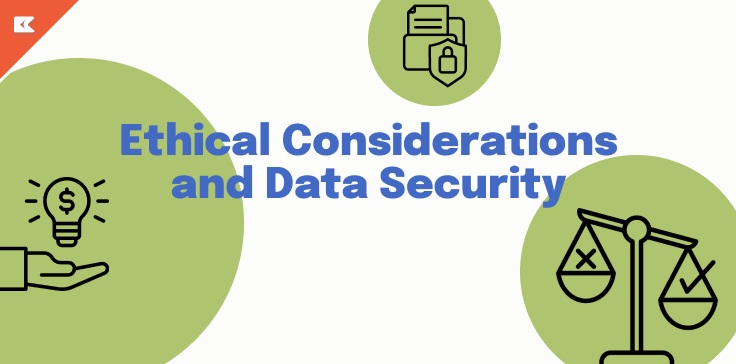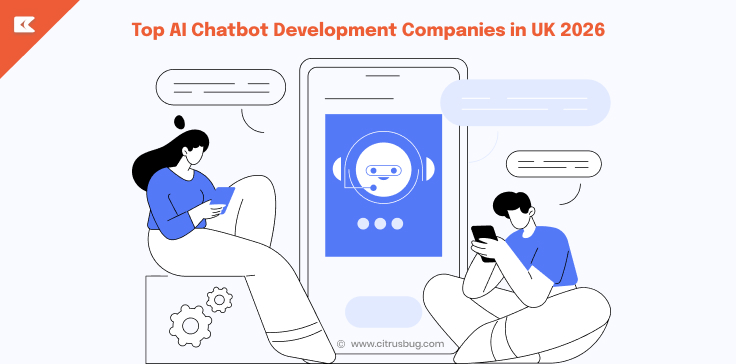The Future of AI Chatbots: Key Trends to Watch in 2025
- October 21, 2024
-
5633 Views
- by Ishan Vyas
Table of Contents
- Benefits of AI Chatbots Across Industries
- 1. The Rise of Human-Like Interactions
- 2. Enhanced Personalization Through AI
- 3. Integration of Voice Technology
- 4. Broader Industry Applications
- 5. Chatbots Driving Sales and Marketing
- 6. Addressing Customer Expectations
- 7. Future Growth Drivers
- 8. Ethical Considerations and Data Security
- Conclusion
The Future of AI chatbots is impressive, transforming them from simple query responders to indispensable tools for customer support. At first, they were limited to answering simple queries. Still, today’s chatbots employ the latest AI and machine learning technologies to generate interactive interactions that greatly enhance customers’ experience.
Straits Research shows that the chatbot technology market growth is projected to be USD 3.62 billion in 2030, growing at an annual rate of 23.9 billion. Thus, as we approach 2025, now is the perfect time to explore AI chatbot use cases, which have revolutionized how businesses interact with clients across various sectors.
Benefits of AI Chatbots Across Industries
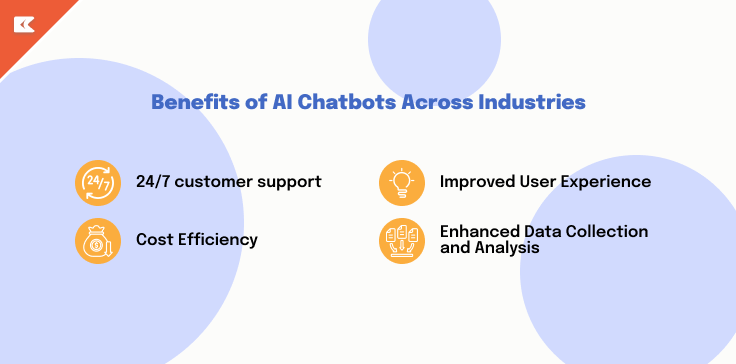
AI chatbots are associated with creative algorithms that engage machine intelligence to understand consumers’ needs, which makes client interplays more effective and entertaining. Let’s delve into the AI chatbot benefits, highlighting their ability to use diverse AI chatbot cases that distinguish various sectors.
-
24/7 customer support:
The ability of AI chatbots to provide round-the-clock customer support is one of their primary advantages. Chatbots, in contrast to people, can operate at any time and guarantee that client inquiries are promptly addressed, regardless of the length of the call.
According to the tidio, customers who have interacted with AI software for customer service had a positive experience, leading to customer satisfaction of up to 80%, and it supports sticking to challenging problems. This is because customers can get their questions answered anytime without waiting for a human representative on hold.
-
Cost Efficiency:
Implementing AI chatbots can drastically reduce operational costs. AI chatbot solutions benefit from mechanizing repetitive movements in any business & can automate repetitive tasks, reducing the requirement for colossal customer service teams while maintaining the highest service standards.
According to Stats, 23% of service organizations rely on AI digital assistants as their main communication channel, which can significantly reduce overhead costs.
-
Improved User Experience:
Chatbots improve the user experience by providing immediate answers and solutions to questions. Their ability to communicate with customers through natural language enhances satisfaction and builds loyalty. According to Cyfuture, the Use of AI chatbots resulted in an effective increase in CTR conversion rates by 12.5X and sales conversions by 4X
They may help clients at every step by offering step-by-step guides for issue resolutions, making product recommendations, providing guidance on fit and size, and promptly responding to inquiries.
-
Enhanced Data Collection and Analysis:
AI chatbots collect valuable information during conversations, allowing businesses to study customers’ behavior, preferences, and feedback. The data can be used to enhance services and personalize the offerings.
By analyzing this data, businesses can uncover trends and preferences, enabling more individualized marketing campaigns. Furthermore, by refining their product offers to suit better client wants, organizations can benefit from the information obtained from AI chatbot engagements.
1. The Rise of Human-Like Interactions
-
Advancements in AI and ML:
AI Chatbots seem more human because of artificial intelligence (AI) and machine learning (ML) developments. With the use of these technologies, chatbots in the future can understand context, identify user emotions, and respond to them in ways that seem more natural to users.
-
User Experience:
The advancements in Conversational AI are revolutionizing customer interactions by allowing chatbots to engage in more human-like conversations. The future of AI chatbots shows a growing emphasis on personalization and the context of AI chatbot trends. These AI-driven customer support systems can identify user intent, respond with relevant solutions, & improve overall customer satisfaction.
2. Enhanced Personalization Through AI
-
Deep Learning Insights:
Chatbots can harness the power of deep-learning methods; chatbots can analyze vast amounts of user information to provide customized interactions. Hence, it allows them to comprehend the needs of each customer more effectively and offer tailored responses.
-
Dynamic Recommendations:
Chatbots can increasingly provide personalized recommendations based on the user’s habits and preferences. For instance, a retailer chatbot could suggest items from previous purchases, enhancing your shopping experience.
3. Integration of Voice Technology
-
Voice-Activated Chatbots:
The widespread adoption of chatbots with the growing trend of voice-enabled chatbots brings excellent benefits for customer support. Tools like AI voice agents leverage advanced AI to deliver human-like voice interactions, facilitating hands-free engagement and enhancing the user experience. Clear voice input is only half the battle, the user also needs to hear responses crisply. A quick primer on the different types of microphones shows why condenser mics excel at capturing high-frequency detail for voice bots, while dynamic mics survive noisy factory floors.
-
User Accessibility:
Voice chatbots improve the accessibility of users from all demographics. When driving, multitasking, or using devices that do not have screens, chatbots with voice can provide users with a simple way to communicate with brands.
4. Broader Industry Applications
-
Financial Services:
Within the BFSI Sector, financial AI chatbots are evolving into intelligent financial advisors aiding customers with inquiries about their accounts or transaction alerts and even fraud detection.
Charles Schwab uses a chatbot to help users and put themselves in the place of other inquiries about money.
-
Healthcare:
By simplifying procedures for patients and doctors, the healthcare AI chatbots significantly impact the healthcare industry, including telemedicine, appointment booking, and patient engagement.
For instance, a standard healthcare chatbot, Ada, resolves data consumers specify to recognize the likely cause behind syndromes.
-
Retail & E-Commerce:
For retail stores, retail AI chatbots improve sales and customer service through proactive interaction, guiding customers on their buying journey and increasing the conversion rate.
AI chatbots are used to connect to internet retailers in the way that Amazon instructs consumers about their orders.
5. Chatbots Driving Sales and Marketing
-
Conversion Rates:
The data shows that chatbots can dramatically impact sales and customer acquisition. Their ability to offer immediate assistance can lead to better conversion rates.
-
Omnichannel Strategies:
Integrating AI chatbots across various channels provides a seamless customer experience as they offer continuous engagement and enhance the user experience. However, many channels already include chatbots, including social media, websites, and mobile applications.
6. Addressing Customer Expectations
-
Speed and Efficiency:
Balancing speedy response and efficient problem-solving is essential for effective customer interactions. Chatbots excel at providing rapid assistance, which customers now demand.
-
Generational Preferences:
Millennials, as well as Gen Z, drive the demand for chatbots with advanced capabilities. Generations with a high-tech background want seamless and effective interactions. Therefore, it drives companies to improve the capabilities of chatbots.
7. Future Growth Drivers
-
Messaging Platforms:
Popular messaging apps are crucial in the rapid acceptance of chatbots. As more users communicate via these platforms, companies will more often integrate chatbots to improve user interaction. With support from RSC marketing, businesses can easily add chatbots to their messaging strategies and boost customer engagement.
-
Internal Enterprise Use:
Beyond the role of chatbots in customer interaction, chatbots are gaining traction within businesses to assist with HR tasks, IT support, and other organizational functions, increasing efficiency and improving workflows.
8. Ethical Considerations and Data Security
-
User Privacy:
As chatbots integrate more into our lives, the importance of ethical conduct in AI and chatbot interaction cannot be overemphasized. Users must be secure and ensure their personal information is handled responsibly.
-
Data Management:
Secure data protection measures are vital to maintaining users’ trust. Businesses should develop strategies focused on users’ privacy and ensure data security to ensure confidence in chatbots’ interactions.
Conclusion
The world of AI chatbots is rapidly changing, and several essential trends are influencing its future. The rise and enhancement of personalization, the emergence of human-like interactions, & the integration of technology for voice will shape AI chatbots in the year 2025. As these intelligent tools are integrated into business strategies, being aware of the latest developments in chatbots is crucial.
We recommend that businesses partner with an AI chatbot development company as it is crucial to develop complex conversational AI chatbots that improve departmental relations and boost their strategies for customer engagement. We at Citrusbug provide advanced AI chatbot solutions customized to meet your business needs. We use the latest chatbot technology to ensure flawless integration and top-notch results. Get in touch with us today to step ahead of the competition.





 SaaS Development
SaaS Development Web Application Development
Web Application Development Mobile Application Development
Mobile Application Development Custom Software Development
Custom Software Development Cloud Development
Cloud Development DevOps Development
DevOps Development MVP Development
MVP Development Digital Product Development
Digital Product Development Hire Chatbot Developers
Hire Chatbot Developers Hire Python Developers
Hire Python Developers Hire Django Developers
Hire Django Developers Hire ReactJS Developers
Hire ReactJS Developers Hire AngularJS Developers
Hire AngularJS Developers Hire VueJS Developers
Hire VueJS Developers Hire Full Stack Developers
Hire Full Stack Developers Hire Back End Developers
Hire Back End Developers Hire Front End Developers
Hire Front End Developers AI Healthcare Software Development & Consulting
AI Healthcare Software Development & Consulting Healthcare App Development
Healthcare App Development EHR Software Development
EHR Software Development Healthcare AI Chatbot Development
Healthcare AI Chatbot Development Telemedicine App Development Company
Telemedicine App Development Company Medical Billing Software Development
Medical Billing Software Development Fitness App Development
Fitness App Development RPM Software Development
RPM Software Development Medicine Delivery App Development
Medicine Delivery App Development Medical Device Software Development
Medical Device Software Development Patient Engagement Software Solutions
Patient Engagement Software Solutions Mental Health App Development
Mental Health App Development Healthcare IT Consulting
Healthcare IT Consulting Healthcare CRM Software Development
Healthcare CRM Software Development Healthcare IT Managed Services
Healthcare IT Managed Services Healthcare Software Testing services
Healthcare Software Testing services Medical Practice Management Software
Medical Practice Management Software Outsourcing Healthcare IT Services
Outsourcing Healthcare IT Services IoT Solutions for Healthcare
IoT Solutions for Healthcare Medical Image Analysis Software Development Services
Medical Image Analysis Software Development Services Lending Software Development Services
Lending Software Development Services Payment Gateway Software Development
Payment Gateway Software Development Accounting Software Development
Accounting Software Development AI-Driven Banking App Development
AI-Driven Banking App Development Insurance Software Development
Insurance Software Development Finance Software Development
Finance Software Development Loan Management Software Development
Loan Management Software Development Decentralized Finance Development Services
Decentralized Finance Development Services eWallet App Development
eWallet App Development Payment App Development
Payment App Development Money Transfer App Development
Money Transfer App Development Mortgage Software Development
Mortgage Software Development Insurance Fraud Detection Software Development
Insurance Fraud Detection Software Development Wealth Management Software Development
Wealth Management Software Development Cryptocurrency Exchange Platform Development
Cryptocurrency Exchange Platform Development Neobank App Development
Neobank App Development Stock Trading App Development
Stock Trading App Development AML software Development
AML software Development Web3 Wallet Development
Web3 Wallet Development Robo-Advisor App Development
Robo-Advisor App Development Supply Chain Management Software Development
Supply Chain Management Software Development Fleet Management Software Development
Fleet Management Software Development Warehouse Management Software Development
Warehouse Management Software Development LMS Development
LMS Development Education App Development
Education App Development Inventory Management Software Development
Inventory Management Software Development Property Management Software Development
Property Management Software Development Real Estate CRM Software Development
Real Estate CRM Software Development Real Estate Document Management Software
Real Estate Document Management Software Construction App Development
Construction App Development Construction ERP Software Development
Construction ERP Software Development





